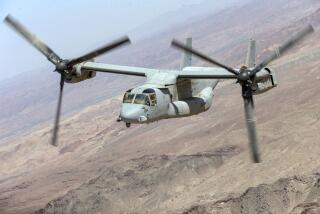Britain Halting Low-Level Air Attacks on Iraq : Military: The move follows the quick loss of six Tornado bombers. Such missions may be resumed later.
- Share via
MANAMA, Bahrain — Britain announced Friday that it is stopping low-level air attacks against Iraqi targets after the loss of six fighter bombers in the first week of war.
Lt. Gen. Peter de la Billiere, the British commander in the Persian Gulf, told a news conference in Riyadh that low-level missions by Royal Air Force Tornado GR1 bombers were not being dropped permanently but “right now we don’t need them.”
The British officer did not connect the change of tactics to the loss of the Tornadoes, which is proportionately the highest of any among the allied air forces, although the figure is still relatively small compared to the overall number of missions flown. The Iraqis had changed the situation by not using the airfields and by keeping their planes hidden in hardened shelters, he said, so the British deem it necessary to change their tactics.
In the early days of the war, there was jubilation among the British forces about the success of the GR1 and an exclusive British weapon known as the JP-233, a cluster bomb that craters runways and blankets an area with anti-personnel mines to prevent repairs.
As the campaign went on, however, losses of Tornadoes began to mount and questions were raised about the tactics being used with the JP-233 because the bomb requires a pilot to approach at a low level, exposing the aircraft to intense groundfire. The Tornadoes primarily are used to attack at night.
British officials appeared increasingly sensitive to suggestions that such tactics were increasing the risks to their air crews. In London on Friday, British Air Chief Marshal David Craig told a news conference that only one of the six losses involved an aircraft using the JP-233 bomb against an Iraqi airfield.
He did not specify the reasons for the loss of the other Tornadoes--but officials have said that five were downed in combat and one was lost to mechanical failures. In addition, Saudi Arabia and Italy have each lost a Tornado.
British military commanders announced Thursday that the Tornadoes are now being equipped with 1,000-pound bombs, which can be dropped from a higher altitude than the JP-233.
Defense Secretary Tom King also announced that Britain is sending a half squadron of Buccaneer fighter bombers to the gulf. Although nearly 30 years old, the Buccaneers are now equipped with advanced laser-guidance systems. Flying in tandem with Tornadoes that are loaded with so-called smart bombs, the Buccaneers can be used to “illuminate” a ground target at an Iraqi airfield while the Tornado drops the smart bomb along the laser path.
Both aircraft can remain at a fairly high altitude during the attack, decreasing the risk of being hit by groundfire. The Buccaneers can also remain aloft for four hours, meaning that they can remain over a target area for several attacks by Tornadoes.
Don Kerr, a defense analyst at the International Institute for Strategic Studies in London, suggested that the switch to new tactics was less related to aircraft losses than the fact that “the initial strategic aims are being achieved.”
The JP-233 cluster bombs are designed only to close airfields in the initial stages of an air attack. Both American and British military officials have said there is evidence that the Iraqis have repaired some airfields within 24 hours and that warplanes at the airports are hidden away in hardened concrete bunkers.
Kerr said the laser-guided smart bombs would prove far more effective in hitting the concrete bunkers than any other weapon. By depending on Buccaneers equipped with lasers for their weapons guidance, the Tornadoes can use all their bomb pods to carry smart bombs.
Group Capt. David Henderson, commander of a British base in the gulf, said the Tornadoes will continue to attack Iraqi airfields to protect allied ground forces once the land assault begins.
British commanders were also extremely sensitive to any hint that the European-made Tornado was not performing up to expectations.
“The crews have got every confidence in their airplane, and you have to have that kind of confidence in your airplane if you’re going to fly it every night,” Henderson said.
More to Read
Sign up for Essential California
The most important California stories and recommendations in your inbox every morning.
You may occasionally receive promotional content from the Los Angeles Times.













